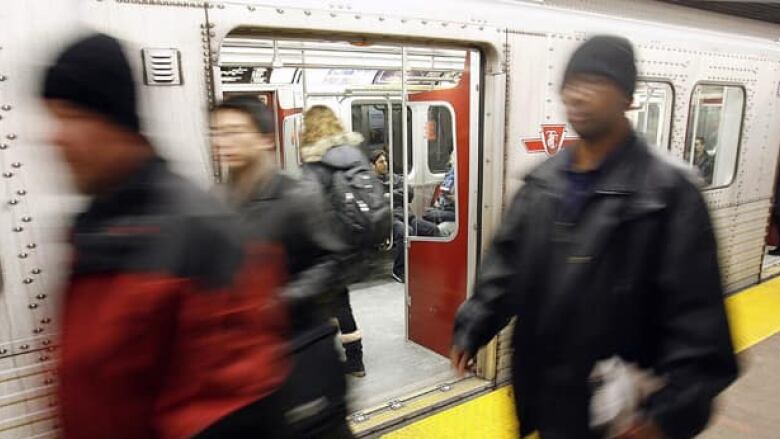'If there is a risk, I want to know about it.' TTC, unions agree to study air pollution
Plan follows research that showed TTC pollution levels highest of Canada's 3 rapid transit systems

The TTC and the three unions representing transit employees have agreed to hire a third party to test air quality across the system a month after a study suggested air pollution is a significant problem on the city's subways.
- Air pollution levels in Toronto subways highest among country's 3 major rapid transit systems
- Union slams TTC over subway air pollution study, raises concerns about worker health
The parties agreed to the testing following a meeting on Tuesday.
All sides still have to agree on which company will be hired to conduct the testing. They mustalso agree to the terms of reference within the next two weeks, Kevin Morton, secretary-treasurer forLocal 113 of the Amalgamated Transit Union, told reporters.
If all sides can't agree to the terms of reference, he said, the study won't go forward. If they do agree, the study can start within a month, he said.
"We all agree that the levels of particulates are bad," Morton said. "We just don't know how bad they are."
TTC CEO Andy Byford said Tuesday that the transit agency was always planning to conduct such a study, but he proposed accelerating the timelineto take the emotion and "misinformation" out of the issue.
"If there is a risk, I want to know about it,And if there is a risk, I won't ignore it," Byford says.
"Let's get the facts straight."
'Their lungs are black'
Morton said workers finish their shift blowing black soot out of their noses.
"Their lungs are black, it's terrible," Morton said. "Their uniforms are black."
Last month, a study initiated by Health Canada suggested that air pollution levels on Toronto's subways are highest among the country's three rapid transit systems.
The research, published in the journal Environmental Science & Technology, compared pollutant levels on Toronto's subway lines with Vancouver's SkyTrain and Montreal's Metro in 2010 and 2011. It found that pollutants on trains and platforms in Toronto were up to 10 times higher than outside air, and about three times higher than levels in Montreal's system. Vancouver's levels were lowest among the three systems.
Researchers measured airborne particles smaller than 0.00025 centimetres, which are easily inhaled and can damage lung tissue. The World Health Organization deems a level of 25 micrograms per cubic metre over 24 hours as a safe level for these tiny particles.
Toronto's outdoor air quality on atypical day would measure around 10 micrograms of pollutant particles per cubic metre of air. That may rise as high as 30 micrograms on a day of poor air quality, study co-author Greg Evens told CBC Toronto last month.
On Toronto subway platforms and trains, however, the study found an average of 100 micrograms of pollutants per cubic metre comparable to"a typical day in Beijing," Evans said.
Masks a point of contention
In response to the study, the TTC said in a statement that the system remains safe and plays a "vitally important role in reducing pollution caused by vehicle emissions."
"Thisstudy was not intended to assess impacts on overall health; ratherit looked at levels of certain commonly occurring particulates and pollution," read the statement issued following the study's release. "This research was done in 2010 and 2011 at a time we had already started taking stepsthat will improve air quality on the trains and reduce certain pollutants in the underground stations."
On Tuesday, Morton accused the TTC of being "derelict in their duty for 22 years" for not letting all workers wear masks on the job.
Asked about masks as he addressed reporters following the meeting, Byford noted that some workers in specific jobs wear "high-technology" masks that are fitted to them and provide specific protection.
"I will not agree to people just heading off to Home Depot or wherever, buying a mask and thinking it gives them protection when there actually may not be any need for the mask in the first place," he said.
With files from Julia Whalen












_(720p).jpg)


 OFFICIAL HD MUSIC VIDEO.jpg)
.jpg)



























































































